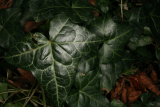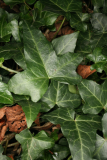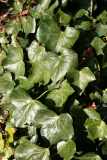Additional notes (click to expand)
Medicinal
Traditional Herbal Medicine Registration (THMR).
A. Vogels' Bronchoforce Chesty Cough Ivy Complex oral drops, licensed for use in the UK for treatment of the symptoms of chesty coughs.
MHRA website http://www.mhra.gov.uk/home/groups/spcpil/documents/spcpil/con1458279906405.pdf (accessed 01/12/2017)
link
Other use
Indication: Relieve symptoms of urinary tract discomfort in men who have enlarged prostate.
Licensed for use in Traditional Herbal Medicines in the UK (UK Medicines and Healthcare Products Regulatory Agency (MHRA)).
Medicines and Health Care Regulatory Authority, 2013 Licensed Traditional Herbal Remedies
According to Culpeper’s Complete Herbal, those who have drunk excessive amounts of wine may be promptly cured of their symptoms by drinking a decoction of ivy leaves, boiled in yet more wine.
Culpeper, Nicholas. (1981). Culpeper's Complete Herbal & English Physician, Pitman Press Ltd. Faximile of 1826 Edition ed p81
Notes by Henry Oakeley from Lindley's 'Flora Medica' (1838): Common ivy is not one’s first choice as an edible plant, but Lindley described it as being employed to prevent drunkenness and to ‘dissipate the effects of wine’ and being an emetic. One suspects that one might not be well enough to get drunk after eating it, but perhaps inducing vomiting removed residual alcohol from the stomach. His hangover cure was noted by Culpeper in 1649 but given boiled in alcohol, ie ‘the hair of the dog’ remedy. We grow it in the beds outside 8, St. Andrew’s Place. Ivy was also used as a ‘sudorific’ – to make people sweat – for sweating was seen as beneficial, as it heralded the reduction of a fever.
Lindley, John. (1838). Flora Medica, Longman, Orme, Brown, Green & Longmans
Toxicity
Side effects/precautions: Hypersensitivity; caution with antitussives (codeine/dextromethorphan), gastritis/gastric ulcer; do not use if pregnant/breast feeding; may cause allergic reactions, gastrointestinal reactions. From Patient information leaflet re Traditional Herbal Medicines in the UK (UK Medicines and Healthcare Products Regulatory Agency (MHRA)).
Medicines and Health Care Regulatory Authority, 2013 Licensed Traditional Herbal Remedies
Toxicity due to saponins.
Professor Anthony Dayan, 2021
Moderately toxic if ingested. Can be allergenic
Professor Anthony Dayan, 2022
Geographical distribution
- Africa, Northern Africa, Algeria
- Africa, Northern Africa, Libya
- Africa, Northern Africa, Morocco
- Africa, Northern Africa, Tunisia
- Asia-Temperate, Western Asia, Cyprus
- Asia-Temperate, Western Asia, Lebanon-Syria
- Asia-Temperate, Western Asia, Palestine
- Asia-Temperate, Western Asia, Turkey
- Europe, Eastern Europe, Baltic States
- Europe, Eastern Europe, Belarus
- Europe, Eastern Europe, Central European Russia
- Europe, Middle Europe, Austria
- Europe, Middle Europe, Belgium
- Europe, Middle Europe, Czech Republic
- Europe, Middle Europe, Germany
- Europe, Middle Europe, Netherlands
- Europe, Middle Europe, Poland
- Europe, Middle Europe, Switzerland
- Europe, Northern Europe, Denmark
- Europe, Northern Europe, Great Britain
- Europe, Northern Europe, Ireland
- Europe, Northern Europe, Norway
- Europe, Northern Europe, Sweden
- Europe, Southeastern Europe, Albania
- Europe, Southeastern Europe, Bulgaria
- Europe, Southeastern Europe, Greece
- Europe, Southeastern Europe, Italy
- Europe, Southeastern Europe, Romania
- Europe, Southeastern Europe, Yugoslavia
- Europe, Southwestern Europe, France
- Europe, Southwestern Europe, Portugal
- Europe, Southwestern Europe, Portugal
- Europe, Southwestern Europe, Spain
- Europe, Southwestern Europe, Spain
- Northern America, Southeastern U.S.A., Georgia
Hedera helix L.
Family: ARALIACEAEGenus: Hedera
Species: helix L.
Common names: Common Ivy
Pharmacopoeia Londinensis name: Hedera
Distribution summary: Eurasia
Habit: Perennial
Hardiness: H5 - Hardy; cold winter
Habitat: Woodlands
Garden status: Currently grown
Garden location: Pharmacopoeia Londinensis 1618 'Gums, Resins, Tears' (HSE 8 B), Plants of the World (C), North America (A)
Flowering months: January, December
Reason for growing: Medicinal, other use, traditional herbal registration



.JPG)